New Bee-ginnings
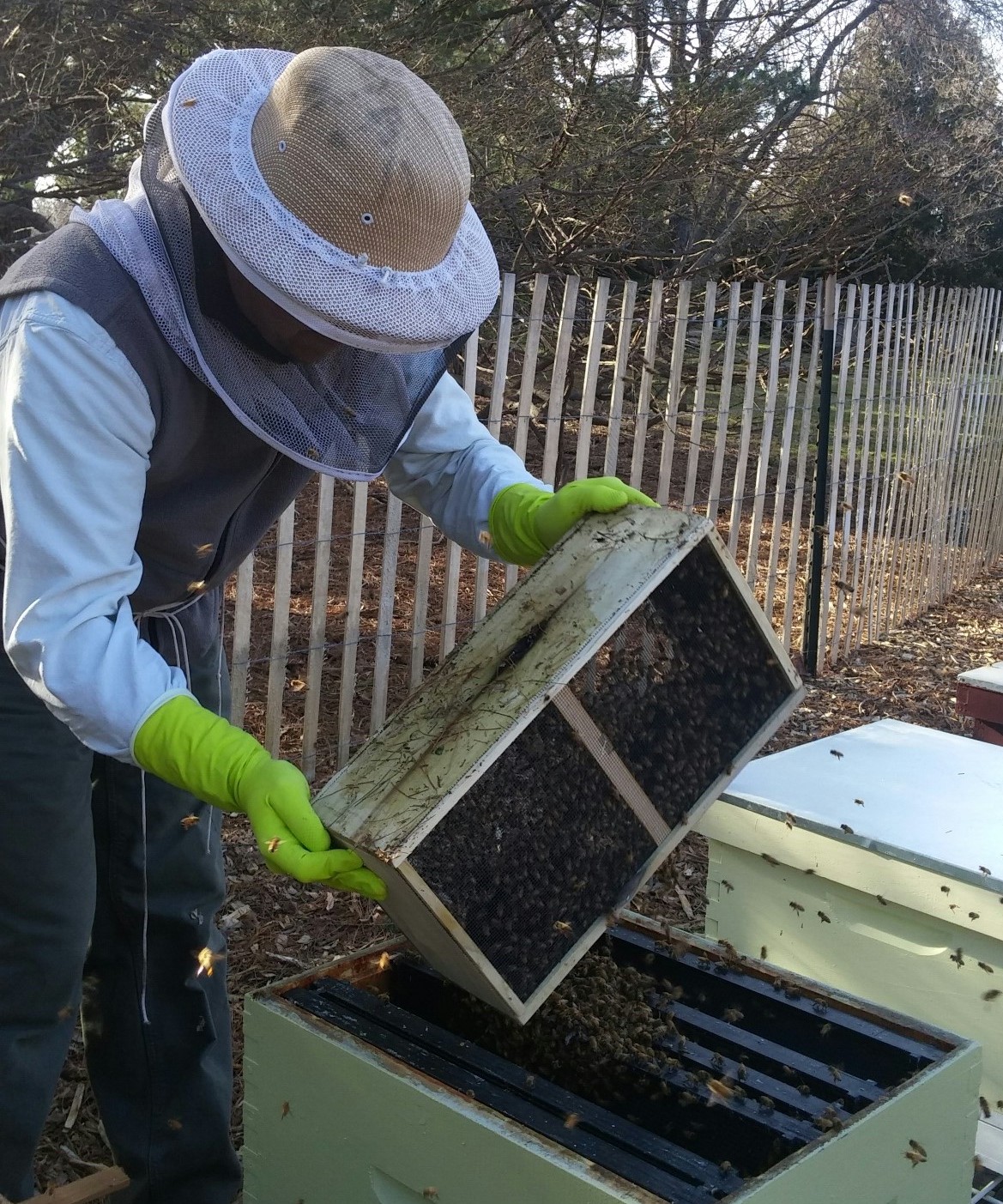
Tucked away in the southwest corner of Mount Auburn, sits a small, fenced-in area that has been sparking the curiosity of many people since early fall of last year. This is the cemetery’s new apiary, which houses three beehives. These hives will be used to pollinate the thousands of trees, shrubs, and perennials that grace our grounds. Mount Auburn joins the ranks of many prestigious sites including Kew Gardens of London, Chicago’s Morton Arboretum, The Scott Arboretum of Swarthmore, PA, the White House, and countless other institutions around the globe that recognize the benefits of keeping bees.
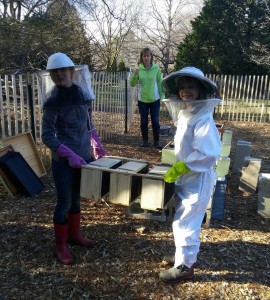 Four years ago, my two daughters joined the local 4-H club in our town. The club holds a visual presentation challenge each year, and my oldest daughter chose the topic of honey bees for her presentation. After reading many books and articles about bees and their behavior, my family and I were intrigued by the notion of raising our own hive. “Well,” we figured, “if we have room for one, then we have room for three.” So we jumped head first into the deep end and have enjoyed honey bees at our house ever since.
Four years ago, my two daughters joined the local 4-H club in our town. The club holds a visual presentation challenge each year, and my oldest daughter chose the topic of honey bees for her presentation. After reading many books and articles about bees and their behavior, my family and I were intrigued by the notion of raising our own hive. “Well,” we figured, “if we have room for one, then we have room for three.” So we jumped head first into the deep end and have enjoyed honey bees at our house ever since.
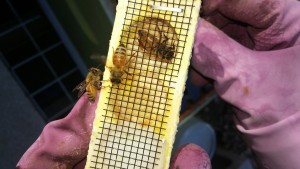 They really are fascinating creatures once you work with them. For instance, each colony contains one queen, a couple hundred drones (male bees), and up to sixty thousand worker bees (all female). They work as one super organism with the goals of keeping the queen safe, producing more bees, and securing enough honey to sustain the colony through winter. Each has its own task to perform. The queen produces over a thousand eggs each day during the warm months. The drone’s only task is to mate with new queen bees, should they swarm away when the colony grows too large. Worker bees perform many functions such as tending the brood, fanning the hive during hot weather, guarding the entrance against intruders, and, of course, producing honey. Bees do not sleep and are constantly working, which is why their life span is only about one month. The queen, however, can live up to five years.
They really are fascinating creatures once you work with them. For instance, each colony contains one queen, a couple hundred drones (male bees), and up to sixty thousand worker bees (all female). They work as one super organism with the goals of keeping the queen safe, producing more bees, and securing enough honey to sustain the colony through winter. Each has its own task to perform. The queen produces over a thousand eggs each day during the warm months. The drone’s only task is to mate with new queen bees, should they swarm away when the colony grows too large. Worker bees perform many functions such as tending the brood, fanning the hive during hot weather, guarding the entrance against intruders, and, of course, producing honey. Bees do not sleep and are constantly working, which is why their life span is only about one month. The queen, however, can live up to five years.
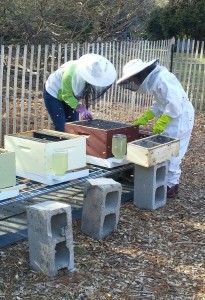 Cooperation amongst honey bees is not unlike the combined efforts of the many Mount Auburn employees who made the apiary project come to life. Five different departments have contributed their efforts thus far. Carlos Quinones and Fred Feliciano (gardening) installed the fence posts, laid the mulch, and trimmed back the trees and bushes. Sean O’Connor (arboriculture) and Darryl Sullivan (gardening) helped install the fencing and gate. Jonathan Webb (also arboriculture) provided the anchors to hold the boxes in place. Steve Brown (preservation) performed necessary maintenance to the hive boxes, and Bill Seaward (mechanic) supplied and cut the foundation table upon which the boxes sit. Maurene Simonelli and I (greenhouse) presented the idea to Dave Barnett and Paul Walker for approval of our project, which was embraced with full support.
Cooperation amongst honey bees is not unlike the combined efforts of the many Mount Auburn employees who made the apiary project come to life. Five different departments have contributed their efforts thus far. Carlos Quinones and Fred Feliciano (gardening) installed the fence posts, laid the mulch, and trimmed back the trees and bushes. Sean O’Connor (arboriculture) and Darryl Sullivan (gardening) helped install the fencing and gate. Jonathan Webb (also arboriculture) provided the anchors to hold the boxes in place. Steve Brown (preservation) performed necessary maintenance to the hive boxes, and Bill Seaward (mechanic) supplied and cut the foundation table upon which the boxes sit. Maurene Simonelli and I (greenhouse) presented the idea to Dave Barnett and Paul Walker for approval of our project, which was embraced with full support.
The goal all along has been to use the apiary as a teaching tool to promote the importance of pollinators and, in particular, bees of all kinds. As an added benefit, Mount Auburn’s guests will enjoy the beautiful fruits and berries our trees and bushes produce, thanks to a honey bee’s visit to their flowers.
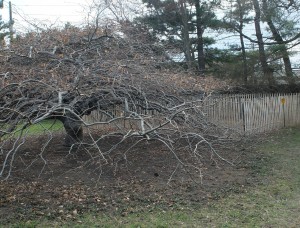 I have situated the apiary behind an umbrella beech tree, out of the way of the public and our workers. Paul Walker is allowing the grass in this corner to grow naturally, without mowing, to minimize the risk of worker contact as the bees come and go from the hives. The bees themselves are of Italian stock, which is among the most docile of bees. They are, however, wild insects and will defend their hive if threatened. Please observe the bees as they work from outside the fence. Although the tree in front of the hives is there to encourage them to fly up and away from the public, some may still choose to fly around the tree. I will maintain the apiary according to the “Best Management Practices” used by the Massachusetts Beekeepers Association.
I have situated the apiary behind an umbrella beech tree, out of the way of the public and our workers. Paul Walker is allowing the grass in this corner to grow naturally, without mowing, to minimize the risk of worker contact as the bees come and go from the hives. The bees themselves are of Italian stock, which is among the most docile of bees. They are, however, wild insects and will defend their hive if threatened. Please observe the bees as they work from outside the fence. Although the tree in front of the hives is there to encourage them to fly up and away from the public, some may still choose to fly around the tree. I will maintain the apiary according to the “Best Management Practices” used by the Massachusetts Beekeepers Association.
I hope you will take time to visit the apiary each season to watch the bees’ progress throughout the year, as they reaffirm Mount Auburn’s commitment to responsible and sustainable stewardship practices within the urban environment.
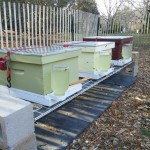
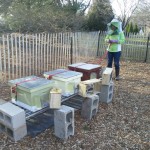

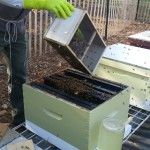
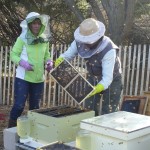
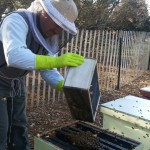
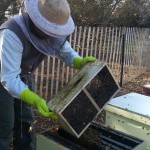
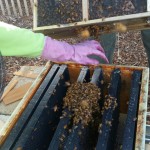
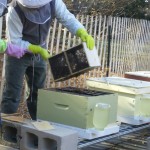
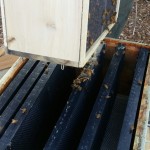
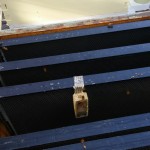
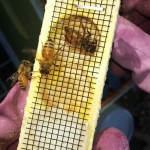
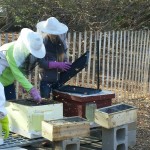

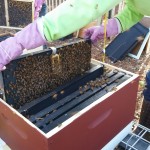
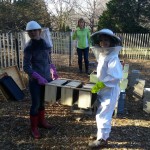
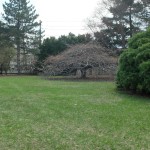
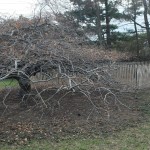
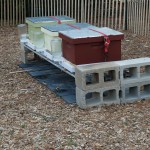

Leave a Reply to Wes Mendenhall Cancel reply